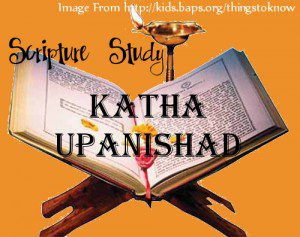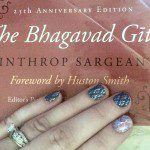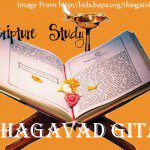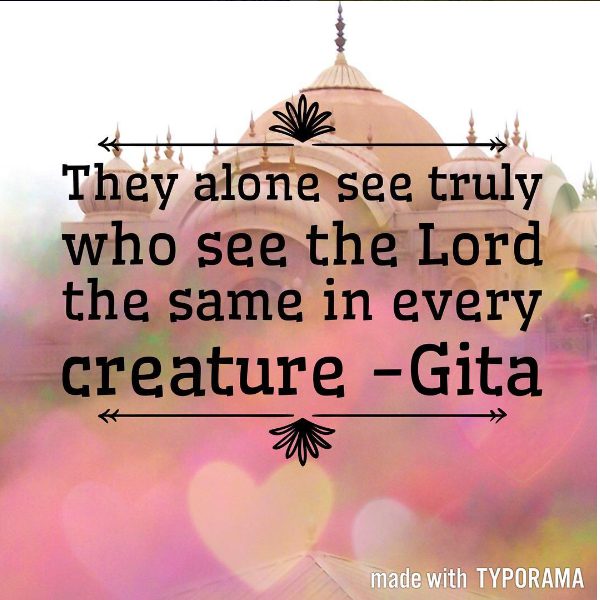We are doing a scripture study together: reading along through some scriptures and discussing the passages. Today is the sixth post of my favorite Upanishad: The Katha. This is the story of a boy who chatted with the God of death.
Chapter III http://www.angelfire.com/electronic/awakening101/upani_katha.html
10—11
Beyond the senses are the objects; beyond the objects is the mind; beyond the mind, the intellect; beyond the intellect, the Great Atman; beyond the Great Atman, the Unmanifest; beyond the Unmanifest, the Purusha. Beyond the Purusha there is nothing: this is the end, the Supreme Goal.
12
That Self hidden in all beings does not shine forth; but It is seen by subtle seers through their one—pointed and subtle intellects.
13
The wise man should merge his speech in his mind and his mind in his intellect. He should merge his intellect in the Cosmic Mind and the Cosmic Mind in the Tranquil Self.
14
Arise! Awake! Approach the great and learn. Like the sharp edge of a razor is that path, so the wise say—hard to tread and difficult to cross.
15
Having realised Atman, which is soundless, intangible, formless, undecaying and likewise tasteless, eternal and odourless; having realised That which is without beginning and end, beyond the Great and unchanging—one is freed from the jaws of death.
16
The wise man who has heard and related the eternal story of Nachiketa, told by Death, is adored in the world of Brahman.
17
And he who, practising self—control, recites the supreme secret in an assembly of Brahmins or at a after—death ceremony obtains thereby infinite rewards. Yea, he obtains infinite rewards.
Chapter-III http://www.vedarahasya.net/katha-3.htm
“The intelligent one will become the praised in Brahma loka (the world of Brahma) for the reason of having recited and heard the Naciketa – Upaagyaana (the Naciketas Story) which is ancient and taught directly by Yama, the Lord of Death.”
“That one who propounds this great secret amidst the wise ones who are interested in self-realization or who teaches it with great interest and dedication during the performance of rituals for the dead (by another), will be greatly benefited and blessed. He will be greatly benefited and blessed.”
Commentary (Swami Krishnananda)
How are you to subdue the senses? How is the charioteer to control the horses? They are mad for objects! What steps are we to take? This difficult effort on the part of the soul is called indriya-samyama or manonigraha.
What do we see? The world of objects. The senses see objects and move towards them. They see only the forms which are called objects and do not understand that there is something behind them. So they are running towards them, thinking that there is something in the object which they themselves lack. Looked at in this way, objects are superior to the senses. But we do not want objects; we want to enjoy their colour, taste, touch etc. Thus, a distinction has to be drawn between objects and their qualities or essence, or substance. These subtle essences, hidden in the objects, are superior to them. The senses want not the objects, but the characteristics hidden in them. The objects are not really the centre of desire. They are only a vehicle which holds the counterpart to our interest. We therefore want to utilise objects as agents for our satisfaction.
…Whatever be the state in which we are, we are going from one change to another. This indicates that there is something seriously wrong in this world. We are like a person walking on one leg, or riding a cycle with one wheel. It can stand as long as it moves, and when it does not move, it falls. There is only ‘becoming’ everywhere, and there is no ‘being’. Our whole life is activity, not existence.
…Beyond the drop is the stream; beyond the stream is the rivulet; beyond the rivulet is the river; and beyond the river is the ocean. There is nothing beyond the ocean. This is what these mantras say. Beyond the senses is the essence of the tanmatras; beyond them is the mind; beyond it is the intellect; beyond it is the virat; beyond It ishiranyagarbha; beyond It is ishvara or avyakta; beyond which is the purusha, and beyond the purusha there is nothing.
…The ocean of the world is limited, but this Ocean is not only outside the things that flow, but also within. While the ocean is at one end of the river, this Ocean is everywhere. God calls us at all places in the world, not merely in the temples and churches. His presence is not only at one end of the world, in heaven. He is everywhere.
(There is much more at the website where I got this material, I highly recommend going over there and reading through it!)
My Thoughts
The imagery of the sharp edge of the razor, difficult to walk across, reminds me a lot of the Biblical image of “narrow is the gate and few are those who enter.” Maintaining our balance in life and remaining focused on the goal is incredibly tricky!
The concept of our desire for objects really being a desire for the qualities hidden within them reminds me of Plato’s concept of the idea object.















